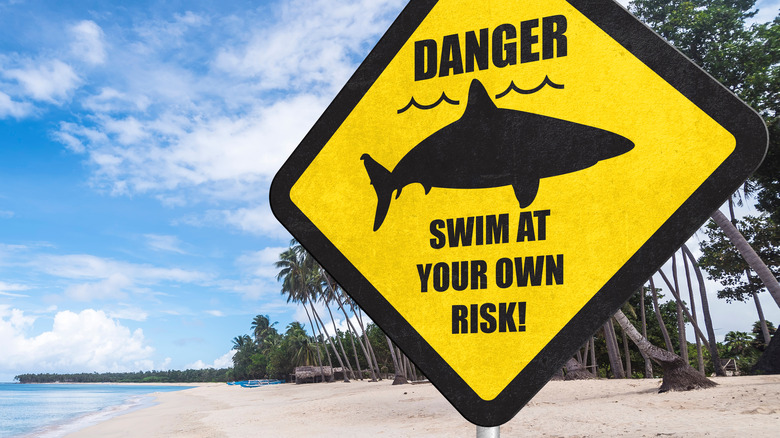Expert Reveals What You Need To Do If You're Attacked By A Shark - Exclusive
Let's face it, even the most avid surfers among us have very little chance of ever being bitten and killed by a shark. According to most estimates, the odds are 1 in 3.75 million that it could happen to you, and other ways of dying in the wild are far more likely, according to Insider. For example, though still somewhat rare, there's roughly a 1 in a million chance that a lightning strike could kill you, according to the Center for Disease Control and Prevention (CDC) data. And as Discover Wildlife notes, tiny mosquitos are far more dangerous to humans than sharks. Sharks, in fact, don't even make the top 10.
Sharks are fascinating apex predators of the sea, though, and surfing and swimming in some parts of the world carry more risk than others. Such as the Indian Ocean French territory, Réunion Island, where fatal shark attacks are so common that surfing and swimming are highly restricted, as Men's Journal reports.
Hosted by Dan Duane, the Sony Music Entertainment's podcast "Réunion: Shark Attacks in Paradise" examines shark attack stories from that area, and speaking exclusively with Grunge, he gives his expert advice on what you should do if you find yourself at the business end of a shark's mouth.
Certain times of day are riskier than others
According to Surfer Today, there are three types of shark attack: hit-and-run, bump-and-bite, and sneak attacks. Shark attacks typically happen near the shore, in surf zones, or near a sandbar. Should a shark attack happens, it likely mistook you for a tasty seal. Because of this, it's best to frequently change direction while swimming to appear less like prey, and avoid contrasting colors which can sometimes catch a shark's attention. Never swim while bleeding, and staying away from murky water in high-risk areas are also both recommended.
Shark attacks around Réunion Island most often come from bull sharks, which can grow as long as 11 feet and weigh as much as 500 pounds. Bull sharks are aggressive and as a result, considered among the most dangerous shark species to humans, though great whites get far more press, as the National Wildlife Federation notes. Still, shark expert and podcast host Don Duane says the best course of action when it comes to shark attacks is to relax.
"Your chances of getting bit by a shark are so low as to be meaningless," Duane says. In places like Réunion Island where attacks are more common, though, Duane says to avoid the water at dusk, dawn, or anywhere there's poor visibility. "Poor visibility means a bull shark can sneak up undetected," Duane adds, also known as a sneak attack, and "... that's how bull sharks like to roll," Duane says.
Should an attack happen, stop the bleeding
Should you be in a high-risk area and encounter a shark, it's best not to panic, try to look the creature in the eye as much as possible, and do what you can to make yourself appear bigger and more threatening, based on reporting from CNN. Or instead, if it seems to be just passing through the area, make yourself smaller so the shark will be less inclined to think of you as a worthy competitor. In the unlikely event there's a shark attack, don't play dead as is sometimes recommended when other creatures, like bears, attack humans. Instead, do everything you can to fight the shark off. If you are badly bitten, do whatever it takes to stop the bleeding.
"If the bite is serious, and there's a lot of blood, your absolute first move should be trying to stop the bleeding by any means possible," Duane says. Surfers will sometimes make their own tourniquet out of the nylon leash that connects the surfboard to their ankle, Duane explains. Other surfers also now carry prefabricated tourniquets, just in case. Either way, "... the main thing is speed — if a shark opens your femoral artery, and that does happen, you can lose enough blood in a minute to pass out," Duane says. After a bite, you can lose enough blood to die in only three minutes, he continues.


